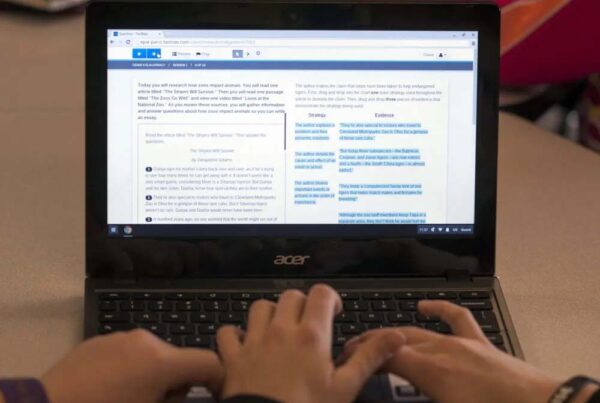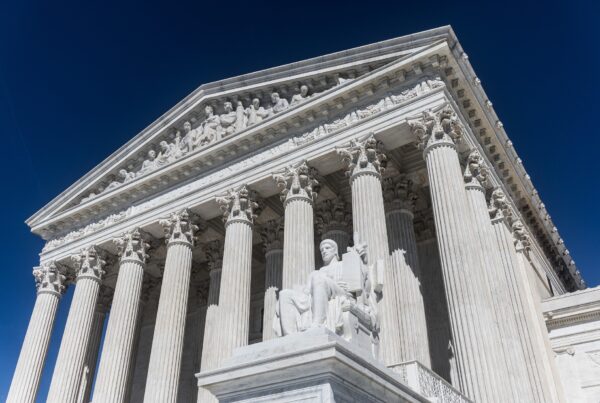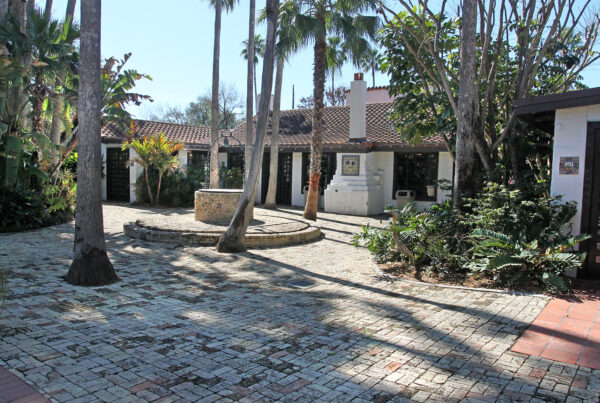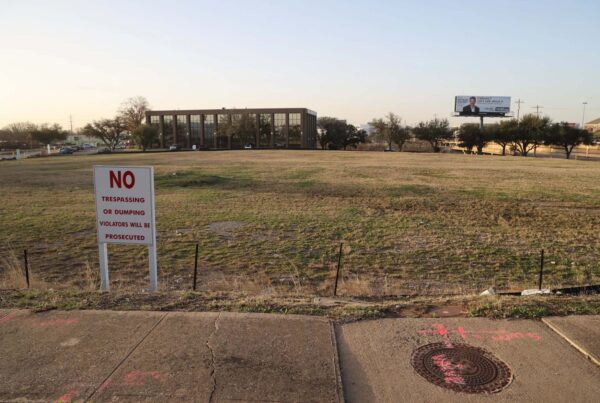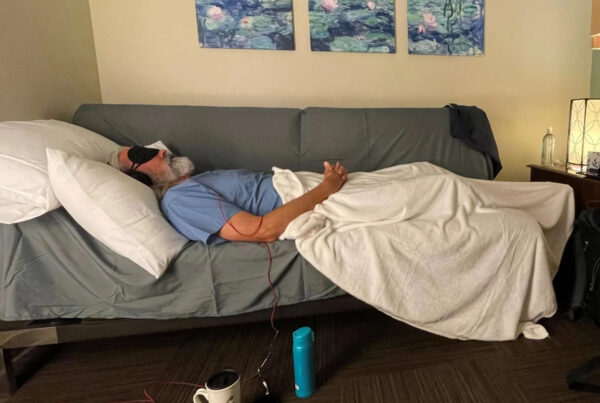From KUT:
State Rep. Carrie Isaac filed a bill last month seeking to ban counties from putting polling locations on college campuses. The Republican lawmaker says the goal of the bill is to make college campuses safer — but students and voting rights groups are pushing back against that claim.
Isaac, who represents Comal County and part of Hays County, filed House Bill 2390 in mid-February, a little over a month into the Texas Legislature’s 88th session. If lawmakers approve the measure, Texas colleges and universities, which often house voting centers open to the public during election season, would no longer be allowed to have them.
“I don’t think it’s wise we’re inviting people to come on to our school campuses that would otherwise not have any business there,” Isaac said. “So, I believe that we should do anything and everything possible just to make sure that our campuses are as safe as possible.”
Isaac also plans to file a bill banning polling locations on K-12 campuses. She said she was moved to act after hearing from parents concerned about school safety.
However, college students argue the bill, if signed into law, would disenfranchise them. Texas State University junior Adriana Montoya said she doesn’t buy the argument that this is about safety.
“This has nothing to do with school safety,” she said. “This has to do with suppressing student voters.”
Montoya, who is the president of her campus’ College Democrats group, said she feels it is hypocritical for a member of the Republican Party to argue that banning polling places will keep college students safe after the same party pushed a campus carry bill through the Texas Legislature in 2015.
“It seems that they’re okay with guns on campuses, but polling sites is where they draw the line,” she said.
Isaac, who was elected in 2022 to represent Texas House District 73, was not part of the Legislature when it approved campus carry.
Joan Burd, a senior at Texas State, said she does not see voting centers on campus as a safety issue. Burd has served as a Hays County election clerk for the last four years.
“In my years working here on the college polling location, I have not felt concerned about my safety,” she said.
Burd said that college students often feel safest voting on campus because they’re familiar with it and comfortable there.
“There are also a lot of young people who are queer or who have disabilities or who have mental health issues, and the polling location is a safe place on campus,” she said. “Many of these people don’t necessarily feel safe going out into San Marcos because it’s a new area, but campus is a place of relative safety.”
Montoya and Burd both said they think Isaac’s legislation would make it harder for students to participate in elections. Many do not have access to cars and already struggle to find the time between classes to cast a ballot, they said. Montoya added that making students figure out how to get off campus to vote creates an unnecessary barrier.
“You shouldn’t have to figure out democracy. You should not have to figure out how to participate in your government,” she said. “It should be easy and accessible to you.”
Isaac said she does not think her legislation would make it harder for students to vote. She suggested that buses could be provided to help students get to off-campus polling locations.
“I have the utmost confidence in our young adults to be able to vote no matter where the polling location is,” she said.
Texas State students have previously fought to increase voting access on campus. Back in 2018, the Republican-controlled Hays County Commissioners Court limited early voting on campus to three days. But they decided to reopen the polling location after voting rights groups threatened to sue. The university had more than 38,000 students at the time.
Montoya said Texas State is still growing and the conversation should be focused on increasing the number of polling sites on campus, not removing them. The university had record-setting freshman enrollment last fall with 7,573 students — up 14% from the year before.
“I think that we’re at a point where we need to be talking about multiple voting locations, not just one and definitely not zero,” she said.
In contrast to Isaac’s bill, State Rep. Gina Hinojosa, D-Austin, has filed legislation this session to require counties to put polling locations on campuses with 8,000 or more students.
Montoya said young people, especially young people of color, are helping to drive Texas’ growth.
“It’s incredibly essential that these people who are responsible for the growth of Texas are able to have a voice in it,” she said. “Because we’re the ones that are going to be left with it.”
HB 2390 could face legal challenges
Voting rights groups are condemning Isaac’s proposal to ban polling places on college campuses. Voters of Tomorrow, a Gen Z-focused nonpartisan group, has said it will sue if her bill becomes Texas law.
“Voters of Tomorrow is prepared to take legal action if this bill becomes a law because it’s a clear violation of the voting rights of young people,” said the group’s spokesperson Jack Lobel.
He described Isaac’s legislation as “outrageous.”
“If you’re removing poll sites from college campuses, you can provide whatever reason you want, but probably you don’t want college students voting,” he said.
The Texas Civil Rights Project is also tracking HB 2390 this session.
“I want to be clear that this bill is not about student safety, but it is about denying students the right to vote,” said Voting Rights Outreach Coordinator Miguel Rivera.
He said the Texas Civil Rights Project is ready to fight the bill every step of the way if state lawmakers advance it. He added college students from Texas State to Texas A&M University have been advocating for more access to polling locations on campus.
The Texas Tribune reported last year that Texas A&M students accused the Brazos County commissioners of voter suppression after they moved an early voting location from the Memorial Student Center on campus to City Hall.
“Seeing the movement that students have had on Texas State’s campus, on Texas A&M’s campus, and across the state, is very indicative of where students’ desires are legislatively and how much they differ from what’s being filed by our leaders,” Rivera said.
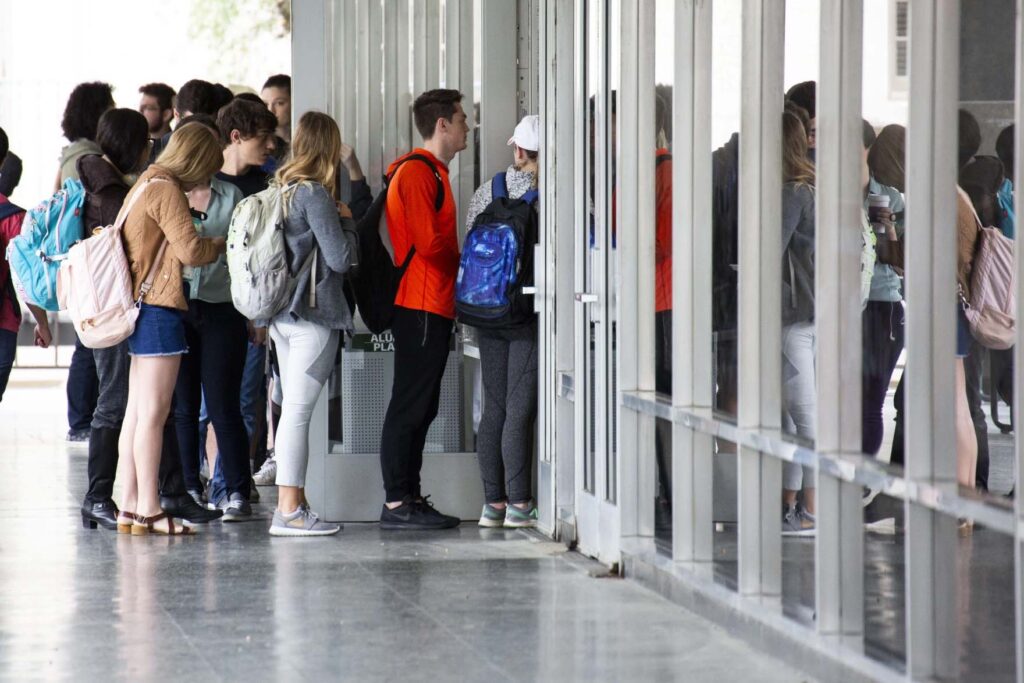
Students wait in line to vote at a polling center on the UT Austin campus during the 2018 midterm elections.
Salvador Castro For KUT
How would the bill impact county election officials?
College campuses and public schools are often used for polling locations because they are convenient and widely known, according to Travis County Clerk Dyana Limon-Mercado. Travis County, which neighbors Hays County and is home to UT Austin, had 38 polling locations at K-12 schools and four at college campuses during the November 2022 election.
“Our K-12 schools are largely neighborhood-based and are generally fairly well known in the community, easily accessible in terms of street access, disability access and the amount of space and electricity required to house a polling location,” Limon-Mercado said.
Similarly, she said, college campuses are easily accessible to students as well as the faculty and staff who work there. Last November, 15,617 people voted early at Travis County’s four polling places on college campuses. Another 3,548 used those locations to vote on Election Day.
Limon-Mercado, who is a Democrat, thinks HB 2390 is intended to disenfranchise young voters.
“We as a country should be encouraging young people who are inheriting the future of our state to have a voice in the policies that are shaping our state,” she said.
Limon-Mercado said she has seen a demand for more polling locations on college campuses.
“It would be a shame to take away that access from not only young people and students, but from the communities that those institutions serve,” she said.
What’s next?
In order for Isaac’s bill banning polling locations on college campuses to advance during the legislative session, it would first need to get assigned to a committee. That committee could hold a hearing on the bill. Neither of those things has happened yet.
Her legislation seeking to prevent counties from placing polling locations on public and charter schools has not yet been filed.
Isaac said that she is also in the process of drafting legislation to expand the school marshal program, which allows certain school employees to carry firearms within K-12 schools.
“I’d like to expand it to military and peace officers to be able to volunteer on our school campuses,” she said.
The current legislative session ends May 29.




